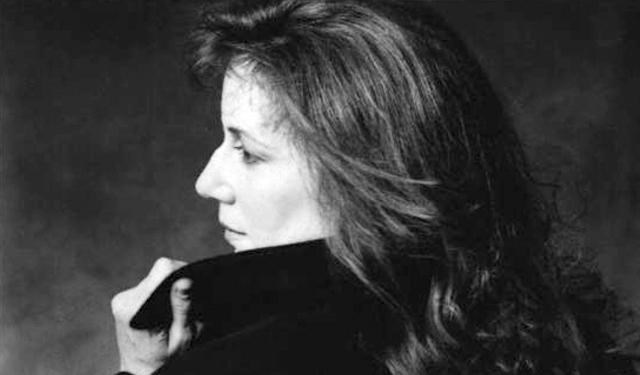As Johnny pulled Baby into his embrace, chest heaving, his eyes dropping to linger on her lips, Jennifer Warnes was standing in a recording room, surrounded by a bowing, plucking, rasping orchestra. She sang "I've had the time of my life" as the famous dirty dance silently unfolded on a towering two-storey screen before her. The scene-defining duet with Bill Medley went on to win the 1987 Academy Award for best original song. While neither the movie (she doesn't watch them), nor the awards (she doesn't know where to put them), have ever moved Warnes much, the music has. Or rather, the connection it brings.
Warnes grew up in Anaheim, California, blessed with a voice that brought churchgoers to tears. "I didn't get it. I didn't understand what that was until much later. That I was able to go places that opened the heart. That set my course," she explains over the phone from a boutique waterfront hotel in Victoria.
But Warnes' path took some unexpected turns. Offered her first recording contract when she was seven, her father turned it down. Instead of following a career in opera, as many expected, by the mid-1960s the heart-faced teenager was pursuing music in Los Angeles songwriter, folksinger, recording artist and landing roles on Broadway (the lead in Hair) and TV (the Smothers Brothers). Twenty years later, she had two Grammys, a Golden Globe, and had performed on three Academy Award-winning songs (It Goes Like It Goes from Norma Rae, Up Where We Belong with Joe Cocker from An Officer and a Gentleman and Time of My Life from Dirty Dancing).
It wasn't until an encounter with Leonard Cohen, though, in a hotel lobby in Connecticut in 1970, with her career firmly established, that she experienced an awakening. Cohen would ask her to sing backup vocals on a tour of his. And then again a second time.
In an interview the Star Pheonix, she says Cohen caused her to "'dump my aspirations to do anything superficial. He, in a way, derailed a perfectly innocent career and turned it into a career with integrity.'"
Cohen, in turn, once described her voice as "like the California weather, filled with sunlight. But there's an earthquake behind it."
She is perhaps best-known as an interpreter of music, due to the phenomenal success of Famous Blue Raincoat (her interpretation of songs by Cohen). "Everytime I put myself on the line to greet someone else's creation with the best of me, I always learn something. I have a career that's very circuitous because I followed the bread crumbs, and if someone asked me to do something I generally found a way to say yes."
Their friendship, and her reputation for working with the best in the music industry across the decades, is best summed up by Warnes herself.
"All the reasons people go into music, and there are many, fall away after the first five or 10 years because you can't stay in the game if your desire isn't to really be good," she says passionately. "And you tend to find the other artists that are interested in craft and skill, and then you've really got something."
The extremely private artist admits she has just acquired her first cell phone and is still without television, preferring to live distraction free in the hills in California, but she is finding an unusual backstory to her own life in the millions of videos on Youtube.
"I'm always inspired by what I see on Youtube, by what I missed. I'm discovering that before the internet we had very insular lives. And we created great things in those insular places, as the Wrecking Crew film [about a group of unknown studio artists in the 60s who played on hits for the Beach Boys, Frank Sinatra, Sonny and Cher, etc.] explains, but now I have a lot of catch-up to do in terms of learning about other genres and what my friends were doing while I was busy," explains the soft-spoken blonde, with a laugh.
And music is still simply the calling for Warnes, a means to an end, neither defining nor abandoning the singer. "I'm just a girl singing. I'm not a nurse, I'm not a technician," she says quietly. "I sing. It's not really complicated, but life is complicated. [The death of my father] was surreal. Life and death, that's big. I'm always knocked off my perch by life, but singing? No. Singing is the easiest part. And when you're finding the thing that you're meant to do, it's easy. There's no fireworks. You're just right in the centre of the target."
She raved about her Victoria audience the evening prior. "I felt like I was singing for my peers. My age group of people, that were, for the most part, a little bit of a renegade crowd. Very awake, the audience last night was wide awake. They got everything so clearly. I felt very close to them," she says, her voice building in assertion.
Â鶹´«Ã½Ó³»gets its turn tonight, when Warnes plays the Vogue tonight at 7:30pm, with only a guitarist and a bassist accompanying her. Tickets are still available from the .
Warnes, who exudes, at times, the essence of an unapproachable icon, starts to warm up at this point. She is perhaps her loosest when talking about the spiritual connection her music creates, rather than her accomplishments or her circle of friends. And then her dinner arrives. She giggles as she tells me what she ordered: Salmon. And the conversation comes to a close; the rest of the stories will have to wait for tonight.


